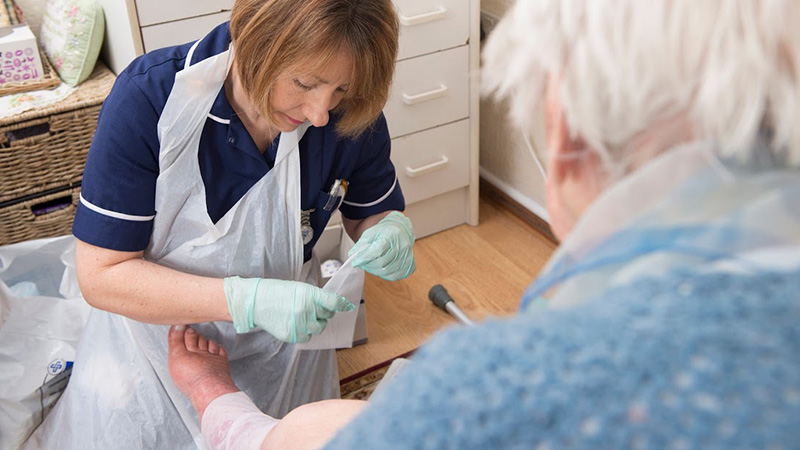District Nursing
PGDip
Key facts
Start dates
September 2024 / September 2025
Course length
Full time: 52 weeks
Part time: 104 weeks
Department
Accreditation(s)
This course is undergoing revalidation with the NMC for September 2024, there will be a change in the module content, subject to NMC approval. Once approved the webpage will be updated.
This course is not available to students classed as International for fees purposes.
Overview
Our District Nursing PGDip is community nurses who want to prepare for (or consolidate) a leadership role.
The course prepares you for the changing face of community nursing. You will:
- strengthen your leadership attributes
- become a skilful specialist practitioner
- learn how to lead and bring about change in your practice environments.
A large amount of your time will be spent in the practice environment. You will have a practice teacher who will support the development of your professional practice.
Our lecturers are experienced in their specialist practice areas. They maintain excellent practice links with those areas locally and across the region. We also have well-established links with national and international colleagues, organisations and institutions. This ensures that the curriculum reflects current practice issues.
You will gain a Nursing and Midwifery Council (NMC) community specialist practitioner (CSP) award.

How to apply
Entry requirements
Specific entry requirements
Access to the DN course is open to practitioners who meet the following criteria.
This course is at level 7 (Master’s Degree) therefore evidence is required of recent study at level 6 (degree level).
You must:
- be registered on Part One (Adult/ RN1/ RNA) of the NMC register as an Adult Nurse and active UK Nurse
- be able to demonstrate evidence of recent study at level 6 on entry
- have secured a student place within an NHS Trust which will ensure the following:
- access to a community practice teacher and placement area
- a source of NHS funding (employment) to enable payment of the course fees.
Self funding for this course is not an option
Please also see the University's general entry requirements.
Screening
All applicants will be screened for fitness to practise and a Disclosure and Barring Service (DBS) check will be made.
English language requirements
A requirement of the application is that you are UK registered nurse with the Nursing and Midwifery Council and a working UK visa that would permit your employment in the NHS as a Nurse.
Please also see the University's standard English language requirements.
Pathways courses for EU students
We offer a range of courses to help you meet the entry requirements for your postgraduate course and also familiarise you with university life in the UK.
Take a Pre-Master's course to develop your subject knowledge, study skills and academic language level in preparation for your master's course.
If you need to improve your English language, we offer pre-sessional English language courses to help you meet the English language requirements of your chosen master’s course.
Terms and Conditions of Enrolment
When you accept our offer, you agree to the Terms and Conditions of Enrolment. You should therefore read those conditions before accepting the offer.
Application process
Oxford Brookes University works in partnership with Berkshire, Milton Keynes, Buckinghamshire and Oxford community NHS Trusts in the recruitment of students; you may apply to any of these NHS Trusts for a place.
Please ensure that you have been offered a place in an NHS Trust before applying to Oxford Bookes University
Tuition fees
Questions about fees?
Contact Student Finance on:
Tuition fees
Fees quoted are for the first year only. If you are studying a course that lasts longer than one year, your fees will increase each year.
The following factors will be taken into account by the University when it is setting the annual fees: inflationary measures such as the retail price indices, projected increases in University costs, changes in the level of funding received from Government sources, admissions statistics and access considerations including the availability of student support.
How and when to pay
Tuition fee instalments for the semester are due by the Monday of week 1 of each semester. Students are not liable for full fees for that semester if they leave before week 4. If the leaving date is after week 4, full fees for the semester are payable.
- For information on payment methods please see our Make a Payment page.
- For information about refunds please visit our Refund policy page
Financial support and scholarships
Funding is secured via application to an NHS Trust for a student post for the 52 week course (Student School Nurse or Student Health Visitor); this will involve an application to NHS jobs for the student vacancy followed by a joint interview with a community NHS Trust and the University. A values based recruitment strategy is used for all aspects of selection. please ensure that you are familiar with NHS Constitution values for professionals.
You should not apply for this course at Oxford Brookes until funding has been secured with an NHS Trust and you have a conditional offer in writing from an NHS Trust to commence the course.
For more information please contact the Programme Administrator.
Additional costs
Please be aware that some courses will involve some additional costs that are not covered by your fees. Specific additional costs for this course are detailed below.
Travel expenses will be incurred (only travel within the practice placement will be reimbursed).
Core texts are available in the university library, there are no essential purchases of books required.
Online submission of assessments eliminate printing costs for all modules.
Learning and assessment
The PGDip in District Nursing (DN) comprises six modules. You will be sponsored or seconded to study full-time over a period of 12 months, or two years part-time.
The importance of working collaboratively is a central philosophy of our course. Interdisciplinary, interprofessional and inter-agency collaboration is key to effective service delivery.

Study modules
Learning and teaching
A variety of teaching and learning strategies are used to make the most of your experience, skills and knowledge:
- seminars
- discussions
- debates
- group work.
You will have access to our virtual learning environment, an online repository of lectures, handouts, information and learning exercises.
The teaching, learning and assessment strategies underpinning the course reflect our interprofessional, client-centred and practice-focused approach. You will spend 50% of your time in the practice environment.
Your community practice teacher (CPT) will facilitate your learning, supervise your progress and assess your competence in practice.
You will critically analyse and evaluate district nurse practice with your lecturers and CPTs. Your assignments will provide a focus for analysing practice.
Field trips
There is an expectation that the course will consist of:
- 45 weeks of structured learning in the 52 week programme
- or 90 weeks - 104 weeks part time.
This will comprise of 50% theory and 50% practice based experience.
You will be able to chose five days alternative practice placement experience in an alternative Health Visiting or School Nurse setting.
In addition, you will gain 10 days in alternative practice settings (public health days). These will be aligned to the public health nurse role in building a wider picture of community practice.
Assessment
Assessment methods used on this course
You will be assessed through a variety of methods:
- written assignments
- practice portfolio
- examinations.
Your practice knowledge and skills will also be assessed. This allows you to demonstrate your ability to develop and critically reflect on practice in line with current professional standards.
Your community practice teacher will assess your competence in practice.
Research
We have a strong research profile. Our experienced researchers work in the following areas:
- cancer care
- children and families
- drugs and alcohol
- physical rehabilitation and enablement
- interprofessional education and collaborative practice.
Our researchers have won external research and consultancy contracts including grants, fellowships and studentships for NHS staff.
Our research staff collaborate with researchers from across Oxford Brookes University and from the Institute of Health Sciences at the University of Oxford, amongst others.
Academic staff have extensive experience of NHS and general management at both senior and director level.
They also have a significant record of research and publications on the topics of management and leadership.

After you graduate
Career prospects
On successful completion of the course:
- you will receive a Postgraduate Diploma in District Nursing
- your details will be forwarded to the NMC to inform of your recordable qualification, and for registration to prescribe (V300).
Programme changes:
On rare occasions we may need to make changes to our course programmes after they have been
published on the website. For more information, please visit our
changes to programmes page.

